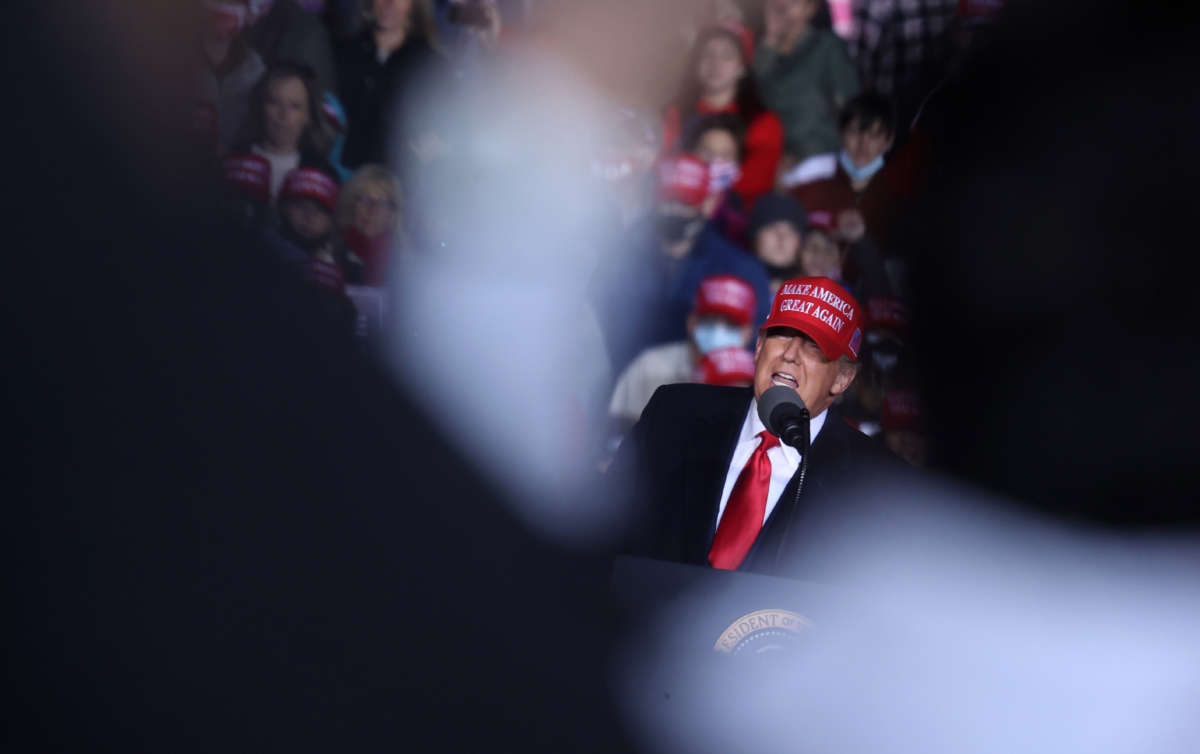Georgia election investigators have just announced that only four ballots were cast on behalf of deceased individuals in the state during the 2020 election — further debunking a lie by former President Donald Trump, who attempted to delay the certification of his election loss by claiming that thousands of dead individuals’ votes were included in the final tally.
“Dead people voted,” Trump said in a call to Georgia election officials shortly after Election Day. “And I think the number is in the — close to 5,000 people. And they went to obituaries. They went to all sorts of methods to come up with an accurate number. And a minimum is close to about 5,000 voters.”
This claim was proven to be false after it was fact-checked back in January — and findings by the State Elections Board over the weekend have further confirmed that Trump’s assertions that “dead people” voted are completely unfounded.
In the same call that Trump lied about votes being cast on behalf of deceased people, he demanded that Georgia Secretary of State Brad Raffensperger (R) “find” votes to help him overcome Biden’s margin of victory in the state. Raffensperger is the head of the State Elections Board, which conducted the recent investigation.
The four instances of individuals casting ballots on behalf of deceased people in Georgia’s 2020 presidential election will now be forwarded from the State Elections Board to the state Attorney General’s office, which will determine whether to pursue criminal charges. State law stipulates that individuals can be fined between $100 and $5,000 for casting illegal ballots.
In one of the examples of fraud, a woman voted on behalf of her deceased husband, who had died prior to Election Day, in order to invalidate her own ballot.
“He was going to vote Republican, and she said, ‘Well, I’m going to cancel your ballot because I’m voting Democrat.’ It was kind of a joke between them,” said attorney Barry Bishop, who is representing the woman who cast her husband’s ballot for him after he died. “She received the absentee ballot and carried out his wishes.”
In spite of failing numerous fact-checks on the issue, Trump has continued to insist that dead people’s ballots were counted in the election. Months after leaving office, he has also inflated the numbers; although he originally claimed that 5,000 votes were cast for dead people in Georgia, in a statement last summer, he said that the number was closer to 18,000 votes.
That claim, like Trump’s other assertions of voter fraud, was not substantiated by any evidence.
Georgia election officials remain steadfast in their refusal to give any credence to Trump’s claims of voter fraud. While speaking to constituents during a recent telephone town hall meeting, Raffensperger reaffirmed what he has said from the start: that there wasn’t widespread fraud affecting the outcome of the 2020 presidential election in Georgia.
“What I tell people is what really happened in Georgia, because we proved that none of that was what happened,” he said.
Join us in defending the truth before it’s too late
The future of independent journalism is uncertain, and the consequences of losing it are too grave to ignore. We have hours left to raise the $12,0000 still needed to ensure Truthout remains safe, strong, and free. Every dollar raised goes directly toward the costs of producing news you can trust.
Please give what you can — because by supporting us with a tax-deductible donation, you’re not just preserving a source of news, you’re helping to safeguard what’s left of our democracy.
